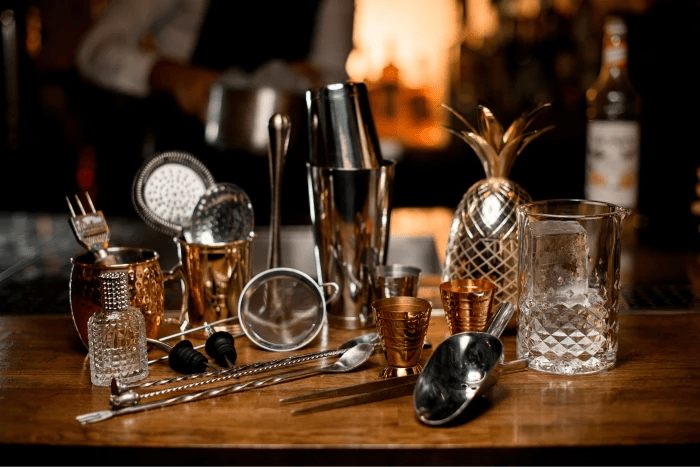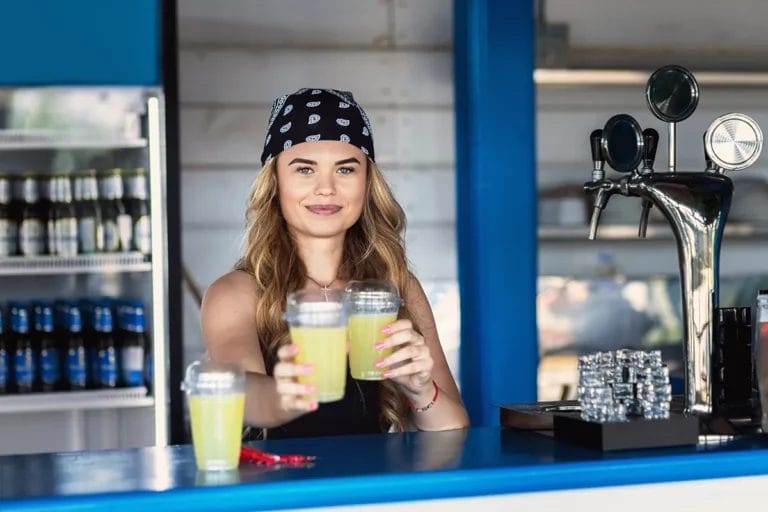Whether you’re just starting in the industry or you’re a seasoned pro, having the right gear is essential for running a successful bartending business. Maintaining a well-stocked kit ensures that you’re always ready for the next event.
The best bartending equipment list includes key items from five categories:
- Equipment
- Glassware
- Alcohol
- Ingredients, mixers, and garnishes
- Technology
From amaretto to citrus zesters, we’re breaking down everything you need to know, including what to get, where to buy, how to maintain your tools, and how to protect your investment with bartender insurance.
Looking for portable bar ideas to keep things moving smoothly? We even created a handy downloadable checklist so you don’t miss a thing!
Bartender Tools and Equipment List
From tools to ingredients, here are your mobile bartending equipment must-haves.
Equipment
These are the essential tools you’ll need when you start an event bartending business and plan to offer a full-service bar:
- Jigger
- Muddler
- Cocktail shaker
- Bar spoons
- Citrus juicer
- Cap catcher
- Bottle and can openers
- Cocktail strainer
- Garnishing tool
- Muddling supplies
- Straws and stirrers
- Bar knife
- Cutting board
- Napkins
- Bar mat
- Clean towels
- Pourers for liquor bottles
- Garnish and bitters container
- Ice cube trays, molds, and bucket
- Ice scoop
- Wine opener
- Rimmer
- Zester
Mobile Bar
If you operate a fully mobile bar, you’ll also need the essential hardware a traditional bar offers.
- Bar coolers
- Refrigerator
- Freezer
- Ice bins
- Blender
- Frozen drink machine
- Draft beer dispenser
- Coffee maker
- Sinks (handwashing, dishwashing, and wet bar)
- Ice maker
- Speed rail
Glassware
Some venues may provide glassware while others will expect you to bring your own. Always verify this ahead of time and include it in your contract.
- Mixing glasses
- Rocks glasses
- Pint glasses
- Shot glasses
- Wine glasses
- Champagne glasses
- Martini glasses
- Brandy snifters
- Highball glasses
- Disposable cups and lids
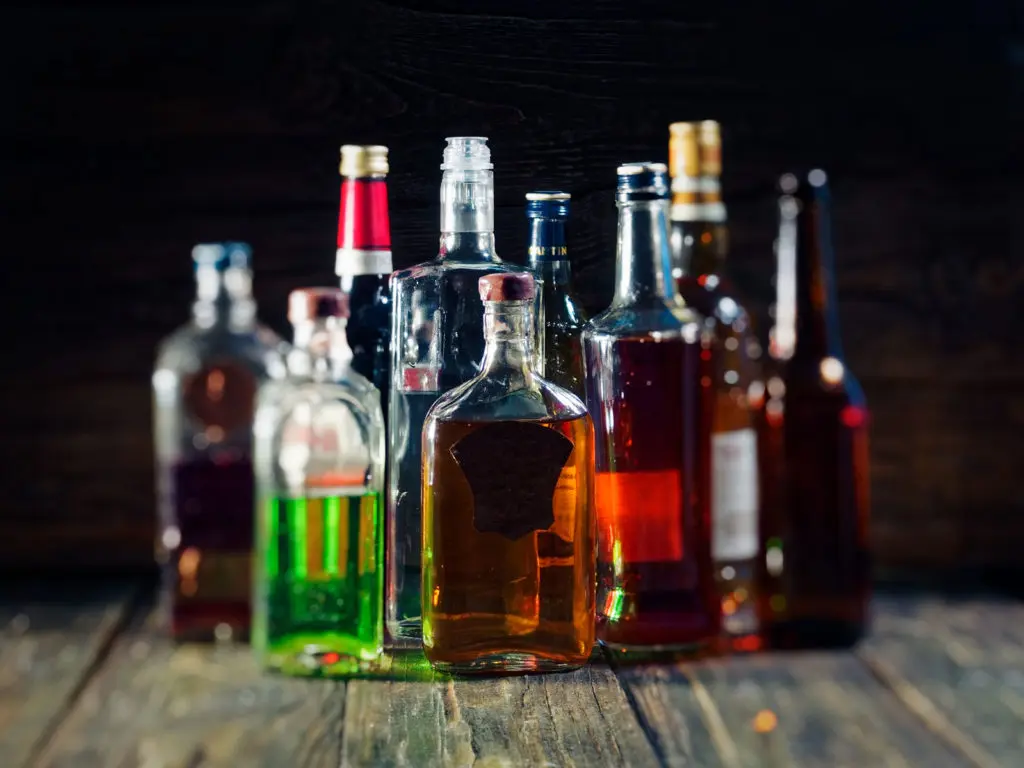
Alcohol
You’ll need at least one of each major type of liquor to prepare a full menu of cocktails. Stock bottom-, middle-, and top-shelf liquors if you prefer to offer more pricing options.
- Vodka
- Gin
- Tequila
- Whiskey
- Scotch
- Bourbon
- Rum
- Amaretto
- Coffee liqueur
- Dry and sweet vermouth
- Irish cream liqueur
- Orange liqueur
Ingredients, Mixers, and Garnishes
Stock your bar based on your menu, client requests, and the most commonly requested drinks.
- Lemon and lime juice
- Orange juice
- Cranberry juice
- Grapefruit juice
- Pineapple juice
- Tomato juice
- Bitters
- Simple syrup
- Sour mix
- Grenadine
- Milk, half and half, or cream
- Tabasco sauce
- Worcestershire sauce
- Club soda
- Tonic water
- Ginger ale
- Cola and diet cola
- Lemon-lime soda
- Lemons
- Limes
- Oranges
- Maraschino cherries
- Olives
- Cocktail onions
- Mint
- Salt
- Sugar
- Cinnamon
- Grated nutmeg
- Celery
- Pickles
- Whipped cream
- Bar snacks — e.g., pretzels, nuts, trail mix
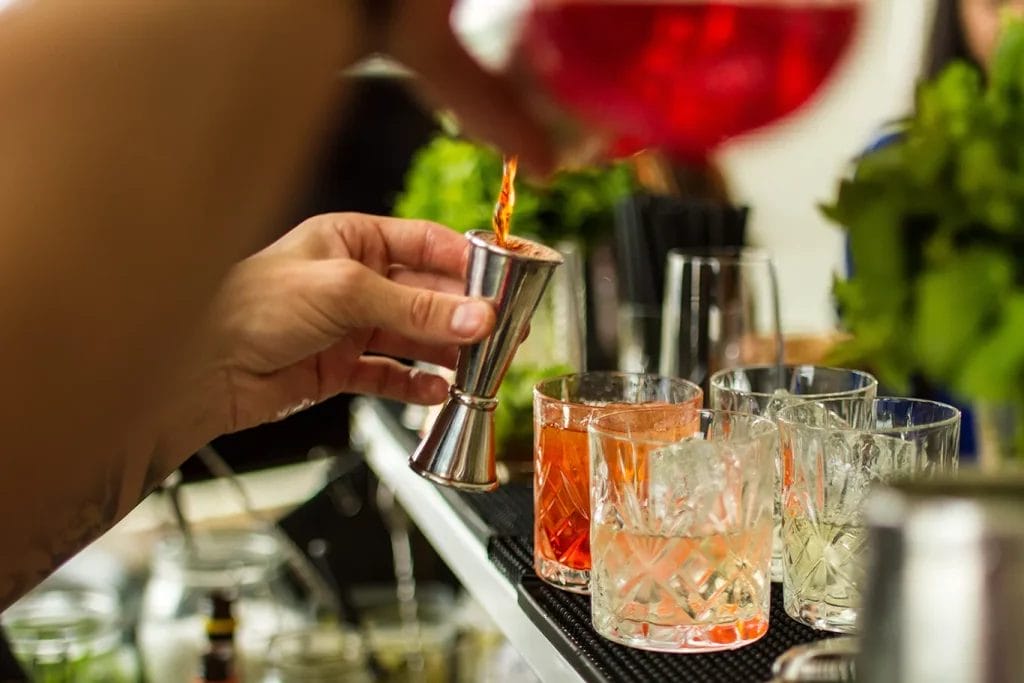
Essential Technology for Bartenders
Aside from your tools and ingredients, you need the right technology to support your business. This can include things like drink recipe apps, booking tools, inventory management apps, and payment processing software.
Drink Recipe Apps
Even if you have years of experience, it’s impossible to know every single cocktail recipe by heart. Rather than frantically searching the web, or (even worse) telling a customer you can’t make their requested drink, download an app for a quick recipe reference.
Here are some of the most useful apps:
- Cocktail Party
- Mixel
- Cocktail Flow
- My Cocktail Bar
Booking Tools
Booking software and apps help you stay organized by tracking your appointments, clients, communications, and more. Some include a variety of features, while others are only dedicated to scheduling, so it’s important to examine your options before choosing one.
Here are a few popular software options:
Inventory Management Apps
Monitoring your inventory of liquors, beers, and wines is vital to maintaining your profit margins. If your business supplies the spirits, you need a tracking app to manage your stock.
Check out these free or affordable inventory management systems for your business:
Point of Sale (POS) Software
A point-of-sale system streamlines your operations by serving multiple functions like payment processing, tab management, and inventory tracking.
When selecting the right POS for your bartending business, consider factors, such as:
- Cost. Some software requires a monthly or annual fee, while others have a free option. Many systems also take a percentage of your sales.
- Mobile compatibility. If you travel to different events and venues, you need a system that goes with you.
- Hardware requirements. POS systems can be permanent installations, a mobile device, or compatible with your phone or tablet.
- Features and capabilities. Options like data reporting, inventory management, tab tracking, and customer support can all support your business operations.
- Commitment. You may be required to commit to several months or a year, while other systems operate on a monthly basis.
Bartenders have plenty of options when it comes to mobile POS systems. Spend some time researching the pros and cons of each to ensure you select the right one for your needs.
To help you get started, here are a few of the highest-rated options for mobile bartenders:
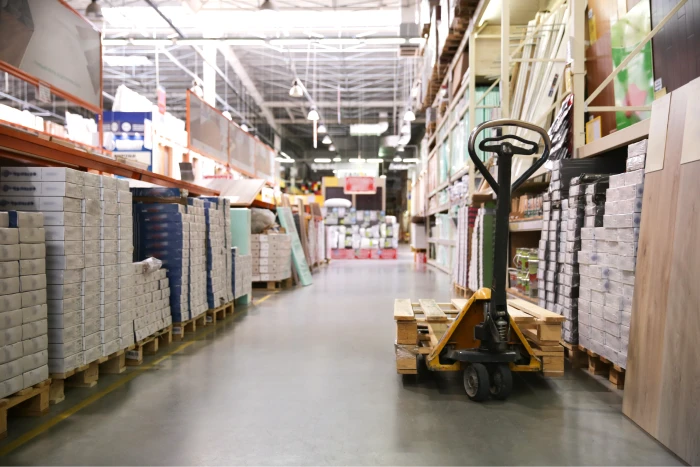
Where to Buy Your Bartending Essentials
When it’s time to stock up your bartending kit, price and quality are the top priorities. Whether you’re building an all-new set or just need to replace a few pieces, you don’t want to break the bank with expensive gear that may or may not last through more than a few gigs.
Where to Buy Bartending Equipment and Glassware
Your best option for affordable, restaurant-quality equipment is to shop at wholesalers. These stores typically carry affordable items designed for heavy use. Research pricing to make sure you find the best deals.
Many areas have a brick-and-mortar restaurant supply store where you can pick up essentials. If you don’t live near one or want to review more options, many online stores sell mobile bartending equipment. A few options include:
Most suppliers carry equipment and glassware, plus disposable items like cups and napkins.
Where to Buy Alcohol
Whether or not you can buy alcohol for your bartending business depends on where you operate. Some areas allow bartenders to buy and supply their own liquor, while others have strict rules around who can purchase and sell it. This varies by state, county, and city.
Make sure to research your local laws to ensure you’re compliant.
Bartenders who work for a bar or catering service can rely on their employers to supply the alcohol. These businesses must have a liquor license and typically stock their shelves through a beverage distributor or wholesaler.
If you bartend at private events, the host can provide the alcohol. This means you aren’t actually selling alcohol, you are just responsible for mixing drinks and serving guests.
In areas where you can get a liquor license and sell alcohol yourself, local alcoholic beverage distributors offer the best prices for wine, beer, and spirits. State stores are also an option, though the retail prices will be higher.
Where to Buy Ingredients and Garnishes
When deciding where to buy your ingredients, take some time to figure out what you’ll need for upcoming events or shifts. With some experience, you’ll get a good sense of what items to stock up on and which drinks sell the most.
If you know you need larger quantities, check out wholesalers like Costco or Sam’s Club. These stores sell groceries and supplies in bulk at reduced prices. However, if you won’t use up large amounts of perishable items, this might not be the most cost-effective option.
Sometimes the local grocery store is your best bet for fresh produce and juices, particularly if you only need enough to serve a smaller crowd.
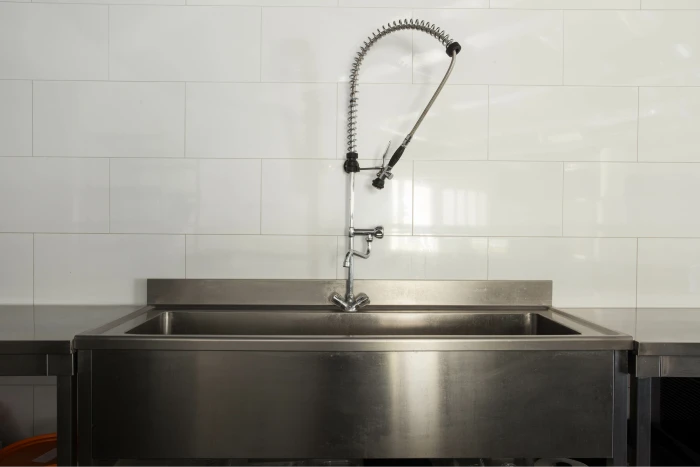
Caring for Your New Bartender Equipment
Maintenance is the best way to make sure your tools last. Not only that but clean, well-functioning equipment helps ensure the quality of your cocktails.
Most of the items on your bartending equipment list should be cleaned and sanitized using the three-compartment sink method. Intricate pieces like strainers and citrus presses may require you to disassemble them or use small brushes to reach all of the crevices.
You need to clean your equipment after making each drink to avoid cross-contaminating cocktails and accidentally blending flavors that don’t mix well. It’s a good idea to keep multiples of your most commonly used tools so you don’t need to stop and clean after each guest.
Pro Tip: Though some tools — like stainless steel shakers and jiggers — are dishwasher-safe, this can reduce the longevity of your tools. The high heat and harsh detergents can damage or discolor these items over time, forcing you to replace them sooner.
Insure Your Bar Equipment
Protecting your equipment should be part of your bartender business plan. Stocking up your kit with the right tools, glassware, and ingredients is a big investment, which is why you need to insure your business.
If your gear gets damaged, broken, or stolen, Inland Marine insurance can cover the cost to repair or replace it so you’re not stuck paying out of pocket.
As a bartender, you already need to carry liquor liability insurance, so why not extend your coverage to safeguard the gear that helps you do the job?
Building a Winning Bartender Bar Equipment List
Creating your kit comes down to your unique needs as a bartender.
If you’re not ready to go all-in, just choose the most important pieces to start and build from there as the need arises.
Before you start shopping, make sure you’re prepared with our free bartender equipment list!
FAQs About Bartending Gear
A basic bartender kit includes essentials for mixing drinks, including:
- Strainer
- Shaker
- Muddler
- Bar spoon
- Jigger
- Citrus juicer
- Bottle opener
- Wine opener
Pre-built kits may contain more items, but these are the most essential pieces.
Your bar setup should include everything you need to mix drinks within arm’s reach. This includes:
- An ice bin
- A speed rail with the most common liquors stocked
- Serving equipment
- Glassware
- Garnishes
Your layout should be as efficient as possible so everything is easy to find.

